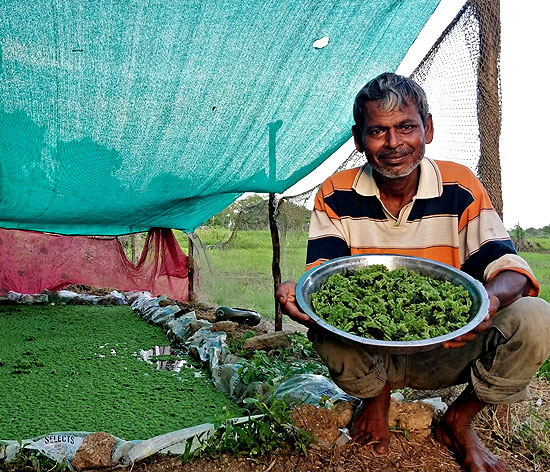Coastal Salinity Prevention and Mitigation
Over the past 30 years, Gujarat has faced serious environmental issues due to the indiscriminate extraction of ground water, which has resulted in the ingress of sea water into arable land, reaching 10-15km inland in many places. Underground water aquifers have been affected, leaving over 1,500 coastal villages with water unfit for consumption. The use of saline water for irrigation has also led to a decline in agricultural yields and decreased soil fertility, rendering land unsuitable for future cultivation. This has resulted in widespread migration and social unrest in the coastal regions of Gujarat. Moreover, the contaminated drinking water, absence of proper waste disposal and the lack of hygiene that arose thereafter have also been responsible for diseases in the region.
In an effort to resolve this environmental issue, the Tata Trusts launched the Coastal Salinity Prevention and Mitigation initiative (also known as Kharash Vistarotthan Yojana or KVY) and set up the Coastal Salinity Prevention Cell (CSPC) in Ahmedabad.
KVY aims to develop sustainable models for the prevention of salinity ingress, and to mitigate its effects and enhance the livelihood resilience of 75,000 households across 525 villages in coastal Gujarat. KVY is active in 30% of the affected area.
The focus of the initiative has been on integrated water resources development and judicious management of the available resources through ground water recharging, aquifer mapping, water use efficiency, and improving water quality through technology interventions.
Farmers are encouraged to switch over to crops that consume less water, and provided technical and advisory services on improved farming practices, vegetable cultivation and horticulture, and diversifying to non-farm-based economic activities.
Realising that fishing is a traditional occupation for the people of this region, KVY imparts technical know-how on scientific methods of fish culture. The organisation also works in the area of education through a project that is being implemented in Devbhoomi Dwarka district, through a joint arrangement between CSPC and the Tata Chemicals Society for Rural Development (TCSRD).
Key achievements
- 47,383 farmers were covered through an improved Package of Practices (PoP) and diversification in agriculture.
- Over 81,000 hectares were covered under sustainable agricultural cropping practices and extension services were provided to over 123,000 farmers through mKRISHI.
- Seven community-based farmer producer organisations, with a membership of 5,697 farmers, were strengthened.
- A collective turnover of around Rs340 million was achieved through input marketing of seeds, pesticides, bio-extracts, animal feed, etc., along with produce marketing of about 7,600 tonnes of groundnut pods.
- 1,738 farmers were covered under measures for micro irrigation systems and efficient water use (drip and sprinkler irrigation) across 2,345 hectares.
- Water-harvesting structures with a capacity of 25 million cubic feet were created to cater to irrigation coverage across 1,208 hectares.
Future plans
The Trusts aim to reach out to 60,000 farmers to undertake sustainable agricultural practices. They also intend to strengthen nine farmer producer organisations, comprising over 10,000 farmers, with an outreach in seven districts. The Trusts plan to bring over 7,000 hectares under water-conservation interventions such as mulching, alternate furrows, intercropping, etc, and to construct 245 water-harvesting structures with a capacity of 35 million cubic feet of water to irrigate 900 hectares of fields.
Area of operation
Gujarat

